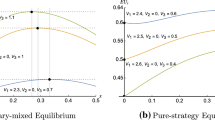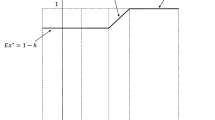Abstract
Contest rules are set up by administrators who frequently have discretionary power in specifying the details of these rules, i.e., they can bias the contest rules toward specific contestants in order to further their prime objective. We derive the optimal bias of the contest rule for a contest administrator, who is interested in maximizing the total efforts expended in the contest. The solution is obtained in closed form for a widely used class of n-person contest games. Setting the optimal bias has important implications: (i) there is never exclusion of strong players, instead there is (endogenously induced) inclusion of weak contestants; (ii) the contest administrator will optimally level the playing field by encouraging weak contestants, but he will not equalize the contestants’ chances unless they are identical; and (iii) at least three contestants will be active in equilibrium of the optimal contest, irrespective of heterogeneity.
Similar content being viewed by others
References
Baye M.R., Kovenock D., de Vries C.G.: The all-pay auction with complete information. Econ Theory 8, 291–305 (1996)
Baye M.R., Kovenock D., de Vries C.G.: Rigging the lobbying process: an application of the all-pay auction. Am Econ Rev 83, 289–294 (1993)
Clark D.J., Riis R.: Contest success functions: an extension. Econ Theory 11, 201–204 (1998)
Congleton, R.D., Hillman, A.L., Konrad, K.A. (eds): 40 Years of Research on Rent Seeking (Vols. 1, 2). Springer, Berlin (2008)
Corchón L., Dahm M.: Foundations for contest success functions. Econ Theory 43, 81–98 (2010)
Cornes R.C., Hartley R.: Asymmetric contests with general technologies. Econ Theory 26, 923–946 (2005)
Dasgupta A., Nti K.O.: Designing an optimal contest. Eur J Polit Econ 14, 587–603 (1998)
Dempe S.: Foundations of Bilevel Programming. Kluwer, Dordrecht (2002)
Epstein G.S., Mealem Y., Nitzan S.: Political culture and discrimination in contests. J Public Econ 1(2), 88–93 (2011)
Esteban J.M., Ray D.: Conflict and distribution. J Econ Theory 87, 379–415 (1999)
Fang H.: Lottery versus all-pay auction models of lobbying. Public Choice 112, 351–371 (2002)
Franke, J.: Affirmative action in contest games. Eur J Polit Econ, doi:10.1016/j.ejpoleco.2011.07.002 (2011, forthcoming)
Fu Q.: A theory of affirmative action in college admissions. Econ Inquiry 44, 420–428 (2006)
Fu, W., Lu, J.: The optimal multi-stage contest. Econ Theory, doi:10.1007/s00199-009-0463-z (2009, forthcoming)
Jia H.: A stochastic derivation of the ratio form of contest success functions. Public Choice 135, 125–130 (2008)
Lazear E.-P., Rosen S.: Rank-order tournaments as optimum labor contracts. J Polit Econ 89, 841–864 (1981)
Luo Z.-Q., Pang J.-S., Ralph D.: Mathematical Programs with Equilibrium Constraints. Cambridge University Press, Cambridge (1996)
Morgan, J., Orzen, H., Sefton, M.: Endogenous entry in contests. Econ Theory, doi:10.1007/s00199-010-0544-z (2010, forthcoming)
Nti K.O.: Maximum efforts in contests with asymmetric valuations. Eur J Polit Econ 20, 1059–1066 (2004)
Outrata J.V.: On optimization problems with variational inequality constraints. SIAM J Optim 4, 340–357 (1994)
Outrata J.V., Kocvara M., Zowe J.: Nonsmooth Approach to Optimization Problems with Equilibrium Constraints. Kluwer, Dordrecht (1998)
Runkel, M.: Revenue sharing, competitive balance and the contest success function. German. Econ. Rev. doi:10.1111/j.1468-0475.2011.00530.x (2011)
Singh N., Wittman D.: Contests where there is variation in the marginal productivity of effort. Econ Theory 18, 711–744 (2001)
Skaperdas S.: Contest success functions. Econ Theory 7, 283–290 (1995)
Stein W.E.: Asymmetric rent-seeking with more than two contestants. Public Choice 113, 325–336 (2002)
Szidarovsky D., Okuguchi K.: On the existence and uniqueness of pure Nash equilibrium in rent-seeking games. Games Econ Behav 18, 135–140 (1997)
Tsoulouhas T., Knoeber C.R., Agrawal A.: Contests to become CEO: incentives, selection and handicaps. Econ Theory 30, 195–221 (2007)
Tullock G.: Efficient rent seeking. In: Buchanan, J.M., Tollison, R.D., Tullock, G. (eds) Towards a Theory of the Rent-Seeking Society, pp. 97–112. Texas A&M University Press, College Station (1980)
Author information
Authors and Affiliations
Corresponding author
Additional information
We would like to thank Marco Runkel and Kai Konrad for detailed discussions as well as participants at several seminars and conferences and three anonymous referees for helpful comments. This research was partially supported by a grant from the international doctorate program “Identification, Optimization, and Control with Applications in Modern Technologies” within the Elite-Network of Bavaria.
Rights and permissions
About this article
Cite this article
Franke, J., Kanzow, C., Leininger, W. et al. Effort maximization in asymmetric contest games with heterogeneous contestants. Econ Theory 52, 589–630 (2013). https://doi.org/10.1007/s00199-011-0657-z
Received:
Accepted:
Published:
Issue Date:
DOI: https://doi.org/10.1007/s00199-011-0657-z




